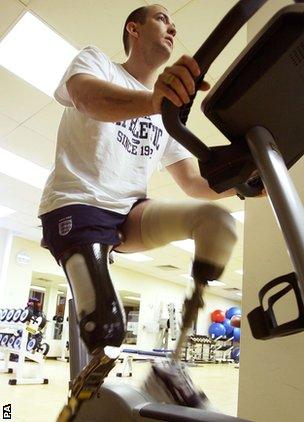Sochi 2014: Mick Brennan targets selection in mono-ski competition
- Published
Mick Brennan hopes to ski for Britain in the Sochi Paralympics
Ten years ago, Mick Brennan had never put on a pair of skis.
Snowy slopes were the furthest thing from his mind as he patrolled the desert terrain of Iraq with the British Army.
He remembers: "In January 2004, a call came out asking for volunteers to go and work with bomb disposal. Luckily enough I got invited to go."
Ten months later, his luck ran out.
A suicide bomb exploded near Sergeant Brennan while he was on patrol,, external hurling him seven metres through the air and tearing off both his legs at the knee. He landed on his head, and was in a coma for two weeks.
But today Mick Brennan is representing his country once again - as a disabled skier fighting to compete for Great Britain at the Winter Paralympics in Sochi.
Mick is in contention for selection in the mono-ski event, where athletes use a fitted seat - which effectively acts as their skiing boot - attached to a single, wide ski, as well as two handheld poles with narrow skis on the end.
"I was doing my rehabilitation in Headley Court in 2008," Brennan explains. "I got asked if I wanted to go on a skiing trip to Germany. I went, and the GB manager at the time, Dave Chugg, pencilled a few of us and said 'Would you want to take this up as a sport?' It's just gone from strength to strength."
But while Mick's natural aptitude and progress have been remarkable, his journey to Sochi contention has been anything but easy.
Two years ago, he was forced to take a year out of the sport for mental health reasons.
"I lost my marriage to it," says Brennan. "I've got anger problems, which is [because of] the frontal lobe damage [sustained in the bomb attack]. I landed on the back left part of my brain, [which deals with] all your memory and your cognitive problems.
"The anger management is the big problem. People can't see what's going off in my brain, and I go from zero to 100 very quickly, so it makes it hard for people to be around me. "
Brennan was sent home for misbehaviour on a Combined Services skiing camp in 2011, and subsequently discharged from the Army - at the same time that he was going through his divorce.
He says: "I think it was just the frustration of being in the Army camp. Everyone else was talking about operational tours, and I was just treading water.
"It's all been sent to test me and I'm lucky that I stuck with it when things got hard."

Mick Brennan regularly works out in the gym to get used to his artificial legs
There were more tests to come though. On his return to the sport in 2013, Brennan quickly recovered his form, and in February he finished 9th at the World Championships in La Molina, Spain. But just a day later, he broke his sternum.
For a double amputee who relies on his upper-body strength to perform even the simplest everyday tasks, it was a devastating setback.
Brennan was out injured for six months. And worse was to come: he had barely been back on the slopes for a month when he fractured his wrist at a World Cup meeting in Australia in September.
But despite the numerous frustrations he has had to endure, Brennan says he will be forever grateful to skiing for helping him to get his life back on track.
"It's the structure [that's helped me] more than anything, and the competition, striving to be the best you can be," he says. "I enjoy being disabled but being able to do the same thing as everybody else. Yes, I'm in a chair, but I can ski as fast, if not faster than a lot of people."
His preparations for the Sochi Games have been far from ideal, and with other competitors having the advantage of months of uninterrupted training and competition, Mick Brennan is effectively playing catch-up.
But Brennan thrives on overcoming adversity, and he says he is confident that he "everything will start clicking into place" before the GB squad for Sochi is selected.
"With the rough time I've had over the past couple of years, if I made it through on my own merit, it would mean absolutely loads to me."
Interview: Nick Hope; Words: James Gheerbrant
- Published16 January 2014